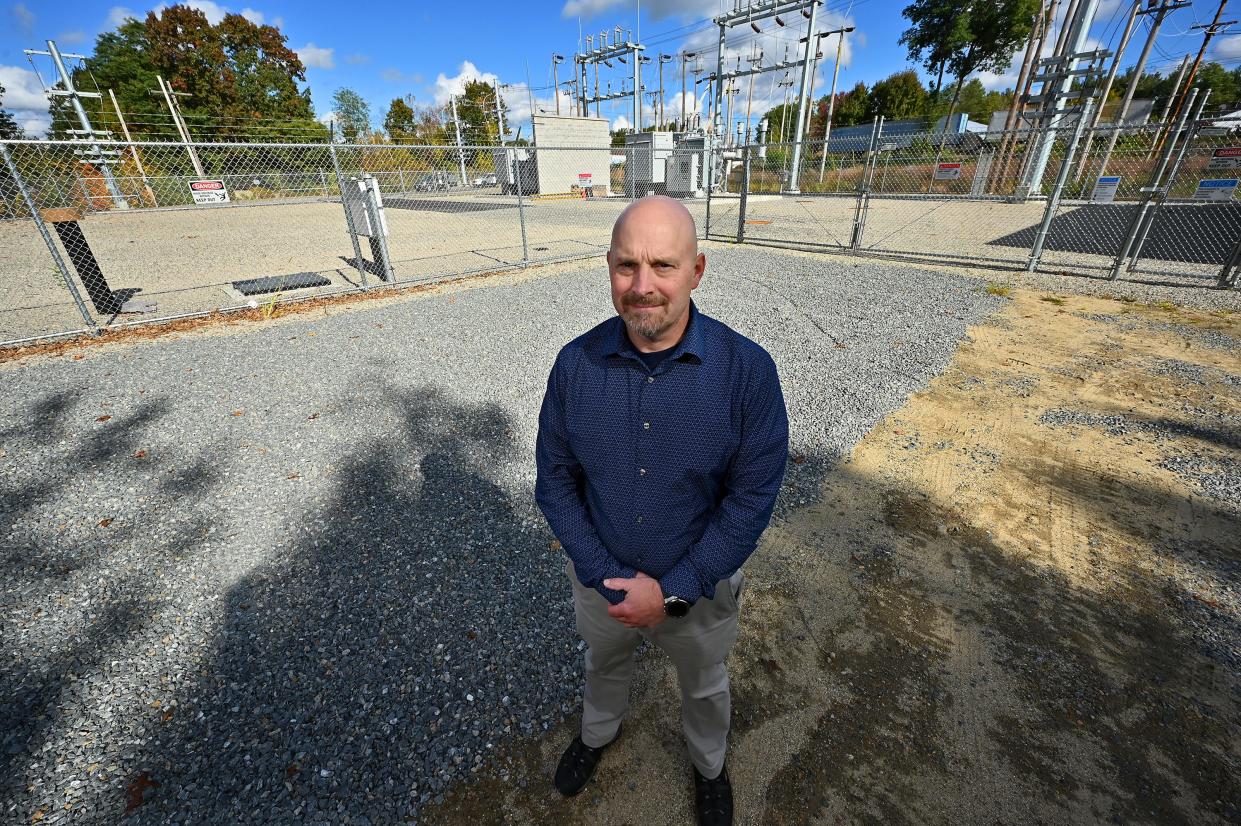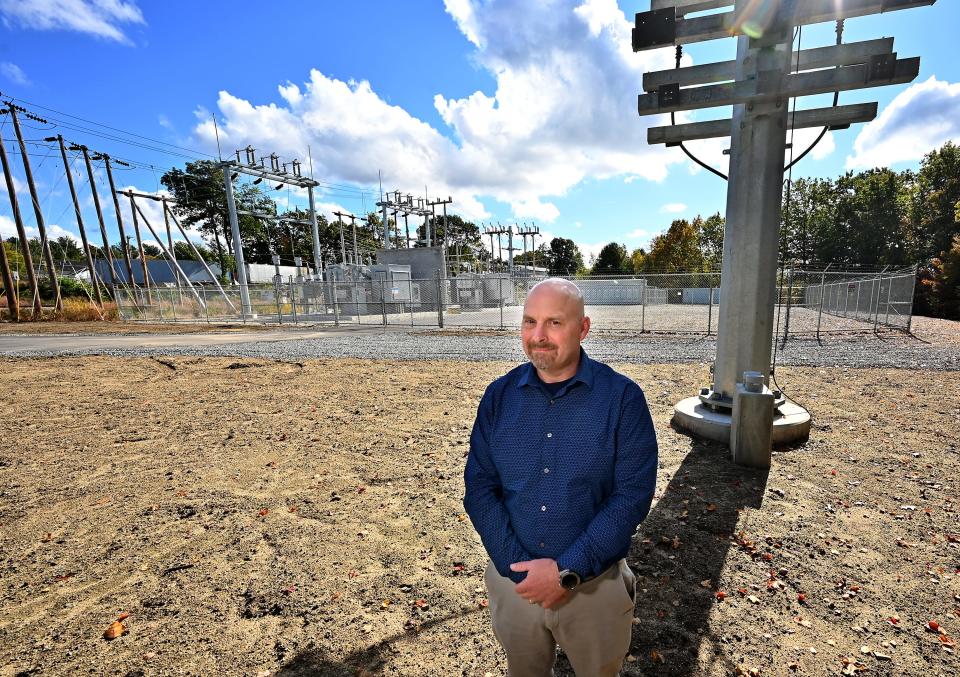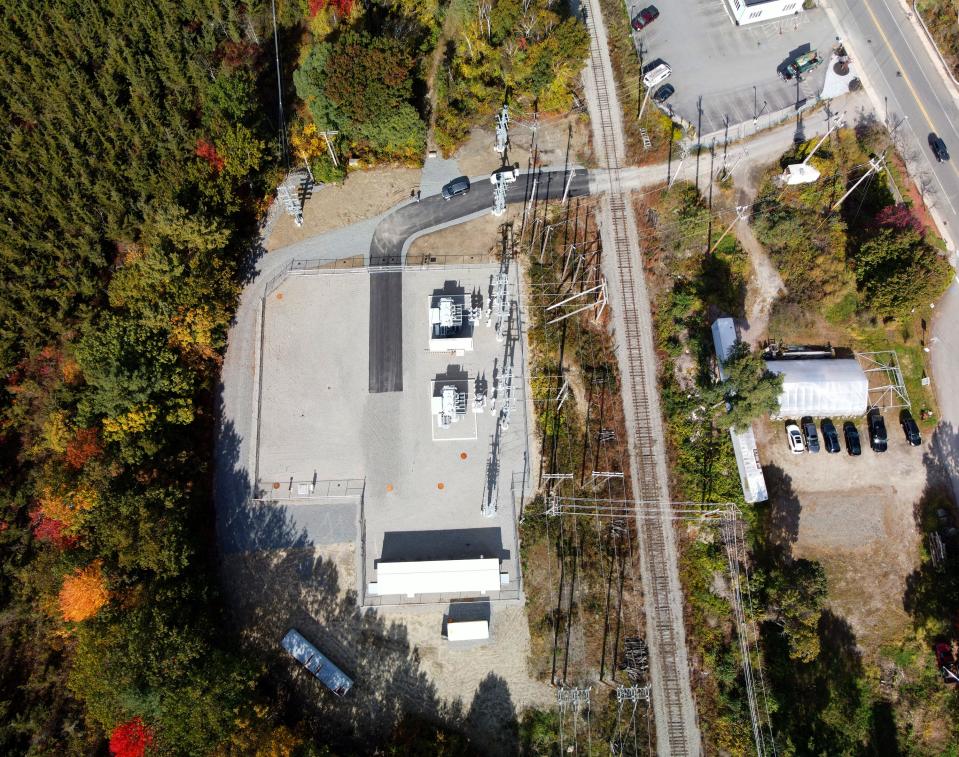Battery storage in Holden: Could it also save big bucks in Worcester?

HOLDEN – An electricity project in Holden touted to supply green energy and create millions of dollars in cost savings for customers has the potential to be replicated in Worcester and throughout New England, according to some industry experts.
The battery storage project will likely look like a row of shipping containers connected to Holden's rebuilt Chaffins substation, and it's expected to save more than $10 million in energy costs over the 20-year life of the project.
Holden owns its electricity system through the Holden Municipal Light Department, and the battery project introduces the question of whether Worcester should control its own electricity utility or continue to have its power supplied by National Grid, the city’s sole electricity supplier.
The city declined a request to interview City Manager Eric Batista and Chief Sustainability Officer John Odell for this story, because a city spokesman said Worcester doesn’t own its electricity system and isn't considering a change at this time.

What is going on in Holden?
Holden is where Virginia-based Delorean Power LLC is building its first battery storage unit in Massachusetts, and the work is expected to wrap up next October. The goal is big reductions in electricity bills for Holden residents and businesses while delivering more energy-efficient power that benefits the environment.
Cost savings in Holden, a town of roughly 20,000 that owns and operates its electric utility, are expected to:
● Top $10 million over the 20-year life of the project, according to the Massachusetts Municipal Wholesale Electric Co.
● The $10 million figure will likely run higher, said Rory Jones, Delorean’s managing partner and co-founder.

Jones declined to disclose how much it will cost Delorean to build the battery system that his company will own and manage. Also, Delorean's revenues over the 20 years are based on a percentage split with Holden on the resulting energy savings. Jones declined to share any details on the split.
The company won a competitive bid to get an exclusive partnership with the Massachusetts Municipal Wholesale Electric Co., which serves 40 municipal utilities in Massachusetts. That means more Delorean battery storage projects in some of the 40 municipal utilities are expected to wrap up construction by the end of next year.
"Holden is the first, and we expect to build more over the coming months and years," said Jones.
'Extremely important'
Barry Tupper, general manager of the Holden Municipal Light Department, described the battery system as "extremely important."
Here’s how it works:
● Delorean pays for, builds and manages the battery storage system. Holden covers the cost of connecting the system to the town's substation.
● The battery takes in power during off-peak hours when energy costs are lower and power is traditionally less carbon-intensive.
● Discharge of the power to customers happens during peak-demand hours so customers aren't paying higher rates. Examples of peak periods can be a heat wave or when homeowners collectively fire up their lights and appliances at night.
● Revenues to Holden and Delorean are calculated by the parties sharing the energy cost savings through a percentage split.

When it comes to the nuts and bolts of Holden’s electricity grid, Tupper explained the town buys its energy from a variety of generation sources, including nuclear, hydroelectric power and wind. Getting that electricity to Holden is done through transmission wires owned and operated by National Grid, and Holden pays the investor-owned utility a transmission fee.
Expert: Battery storage will work in Worcester
Jones believes Delorean’s battery storage system will work in Worcester, because his company is developing projects across New England, not just in communities that own and control their electricity.
“We would be interested in working with Worcester,” he said.
Benefits to Worcester, according to Jones, would come from the Massachusetts Clean Peak Energy Standard. It provides incentives to clean energy technologies that can supply electricity or reduce demand during seasonal peak demand periods established by the state Department of Energy Resources. As a result, ratepayers in Worcester would save money, said Jones.
There is also a scenario where National Grid could supply Worcester with battery storage, said Amy Boyd Rabin, vice president of policy at the Environmental League of Massachusetts. The result would be less transmission expenses for the utility.
"You could theoretically bring cheaper power and have savings for everyone involved," including for Worcester and National Grid, said Rabin.
Why doesn't Worcester follow Holden's lead?
If Worcester could take advantage of battery storage savings, some questions arise: Why doesn’t Worcester operate like Holden and own its electric utility? Why not save customers money and use greener energy?
Rabin called such a possibility “incredibly complex” and “vastly unlikely politically” for two reasons. One is the massive cost for Worcester to buy National Grid’s delivery system that includes utility poles, wires and underground infrastructure. The second is the likelihood of lawsuits from National Grid, even if a contract was signed by the parties for transfer of grid control. Lawsuits could come from multiple fronts, said Rabin, including who controls maintenance and operation of a Worcester-owned electric system. Would it be Worcester or subcontracted back to National Grid?
“Simply put, the cost savings for Worcester would be uncertain, while the expense of doing it would be fairly high,” said Rabin. She believes it would take a statewide ballot question like the one next month in Maine for Worcester to potentially become the master of its electric utility.
Maine voters head to the polls Nov. 7 to decide if a nonprofit, consumer-owned utility called Pine Tree Power will replace Central Maine Power, the state’s largest utility. If voters transfer control to Pine Tree Power, Rabin said it would take a thumbs-up vote for a similar ballot question in Massachusetts for Worcester to negotiate the purchase of National Grid’s assets so the city can control its electricity.
Even if Massachusetts voters took control away from utilities like National Grid, the result would likely be challenged in court on the grounds that the state can’t seize a utility’s property, said Rabin.
Good and bad for National Grid
Rabin said battery storage systems like Delorean’s could hurt — and help — National Grid’s financial bottom line.
She explained National Grid receives a lower transmission fee when a battery is charging because it cost less to transmit power during off-peak hours. Meanwhile, National Grid will save money because it's cheaper to deliver power during off-peak hours.
“If all towns (owned their municipal electricity operations), then National Grid would not have to build extra transmission towers and have extra contracts for super-peak days in the summer. There are savings for National Grid, too," said Rabin.
National Grid said in a email that new technologies like battery storage must be part of the equation for Massachusetts to reach its electrification goals and reduce its reliance on fossil fuels.
The utility said it has interconnected power from batteries, expects to do more in the future, and noted that battery storage defers or avoids transmission investments and helps customers save money on bills.
Meanwhile, National Grid believes it must manage "distributed energy resources," including batteries, into the grid. If that doesn't happen, customers will face increased costs.
"Without direct utility management to integrate these DER facilities into the grid, utilities confront managing unpredictable DER activity, and DER customers are left with grid expansion costs to accommodate all operating conditions," said an email from the utility. "National Grid is actively investing in data capabilities and control system centralization and developing flexible connections solutions to improve the ability to operate and manage the network."
Contact Henry Schwan at henry.schwan@telegram.com. Follow him on X: @henrytelegram.
This article originally appeared on Telegram & Gazette: Holden launched battery storage project to save costs for customers

